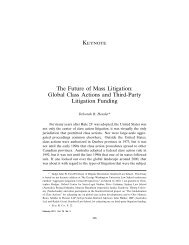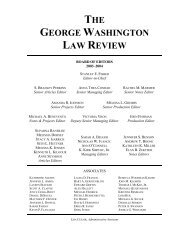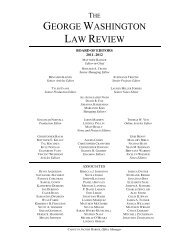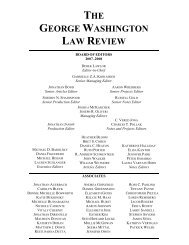View PDF - The George Washington Law Review
View PDF - The George Washington Law Review
View PDF - The George Washington Law Review
Create successful ePaper yourself
Turn your PDF publications into a flip-book with our unique Google optimized e-Paper software.
862 <strong>The</strong> <strong>George</strong> <strong>Washington</strong> <strong>Law</strong> <strong>Review</strong> [Vol. 78:846<br />
consin. You mold the common law, and except on federal<br />
questions, you are really Supreme. But he said, “I can tell<br />
you, that it would be nice come 70 to know that you can go<br />
on for life at a higher salary.” He was or would be getting a<br />
fairly modest pension from Wisconsin, so that’s the nittygritty<br />
money side. It weighed heavily, but I was also trying<br />
to compare the satisfaction in the work, the relative importance<br />
of the two courts and all that. Oh, Willard Hurst. I<br />
talked to him. A lot of people feel that the federal court is a<br />
higher court. In a way it isn’t. It has a different feel and<br />
considers different questions. <strong>The</strong>re are some like habeas<br />
corpus in which the decision of a federal court of appeals<br />
supersedes that of a state supreme court. But there are other<br />
areas, such as cases between persons who are citizens of different<br />
states where the federal courts must follow the rulings<br />
of the state supreme court. <strong>The</strong>re is no more real prestige<br />
there except in the public mind. I struggled hard, but finally<br />
chose the federal court. 67<br />
<strong>The</strong>re are three primary pieces of information relating to the judicial<br />
process that we can extract from these excerpts. <strong>The</strong> first is that<br />
political connections coupled with a certain amount of serendipity led<br />
to Judge Fairchild’s appointment. <strong>The</strong> second is that the conditions of<br />
a federal judgeship—particularly salary and life tenure—played a significant<br />
role in his decision to take the position. <strong>The</strong>se are hardly surprising<br />
revelations. <strong>The</strong> third thing we learn, which is a unique piece<br />
of information, is that Judge Fairchild seems to have preferred his<br />
work on the Wisconsin Supreme Court to that on the Seventh Circuit.<br />
As he notes, most observers would regard appointment to the federal<br />
court as a promotion. And he does not say that the Supreme Court<br />
was a better job—among other things, it brought a lower salary and<br />
the need to worry about reelection—but it is clear that he found it<br />
more enjoyable.<br />
<strong>The</strong>re are other interesting bits of information in the 1992 oral<br />
history that did not make Federal Judges Revealed. In responding to a<br />
question about a law review article he wrote, 68 Judge Fairchild notes<br />
that he “was certainly brought up to believe that when a court overruled<br />
a prior decision, it was just making itself right where it had been<br />
wrong before, that the law had always been there, and just misperceived<br />
before, and therefore all the current law is completely retro-<br />
67 1998 Interview, supra note 50, at 18–19.<br />
68 Thomas E. Fairchild, Limitation of New Judge-Made <strong>Law</strong> to Prospective Effect Only:<br />
“Prospective Overruling” or “Sunbursting,” 51 MARQ. L. REV. 254 (1967).









